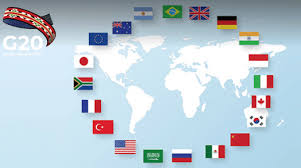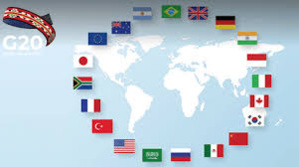The urgent need for countries around the world to bring the spread of the coronavirus pandemic under control was stressed by financial leaders from the Group of 20 major economies while also pledging to "do whatever it takes" in order to support the global economy and financial stability.
An agreement in principle on creating a "Common Framework" to deal on a case-by-case basis with the rising number of low-income countries facing debt distress was arrived at for the first time by the G20 finance ministers and central bank governor, according to a lengthy communiqué published by the meeting.
But according to sources familiar with the G20 deliberations, that statement from the G20 countries at the meeting has significant impact on China since the banks of the country have become major creditors to poor countries of the world in recent years and Beijing has balked at the suggestions of writing off any of the debts.
The new framework needs to be finalised at an extraordinary meeting before G20 leaders meet next month by the officials, said the final draft of the communiqué which was formulated during the annual meetings of the International Monetary Fund and World Bank, said reports.
A freeze in official bilateral debt payments was also agreed to be extended by six months by the G20 officials because of continued liquidity pressure on low-income countries due to the pandemic. The officials also expressed their concerns and disappointment that there were not enough private-sector creditors agreeing to participate in the moratorium
It was important to see past the G20's Debt Service Suspension Initiative which has only deferred the debt repayment but has not reduced them, said World Bank President David Malpass while addressing told G20 officials.
For the most indebted of the world's poorest countries, there was need for more forceful and quicker action on debt reduction because of the crisis, he said and added that the pandemic related economic crisis for the poor countries poses the threat of pushing 150 million more people in extreme poverty by 2021.
"The recession in advanced economies is less severe than had been feared, but in most developing economies, it has become a depression, especially for the poorest," he said. "It's urgent to make rapid progress on a framework because the risk of disorderly defaults is rising," he said.
The uneven and highly uncertain future of the global economy was acknowledged by the G20 leaders who also promised to continue to address the disproportionate economic impact that the health crisis has had on women, young people and other vulnerable segments of society.
Work on a vaccine required more international cooperation and global income could be boosted by $9 trillion by 2025 by early progress for which more international cooperation was required, said IMF Managing Director Kristalina Georgieva at a news conference.
"Nine months into the pandemic, we are still struggling with the darkness of a crisis that has taken more than a million lives, and driven the economy into reverse, causing sharply higher unemployment, rising poverty, and the risk of 'a lost generation' in low-income countries," she said.
"A durable economic recovery is only possible if we beat the pandemic everywhere," she said.
(Source:www.livemint.com)
An agreement in principle on creating a "Common Framework" to deal on a case-by-case basis with the rising number of low-income countries facing debt distress was arrived at for the first time by the G20 finance ministers and central bank governor, according to a lengthy communiqué published by the meeting.
But according to sources familiar with the G20 deliberations, that statement from the G20 countries at the meeting has significant impact on China since the banks of the country have become major creditors to poor countries of the world in recent years and Beijing has balked at the suggestions of writing off any of the debts.
The new framework needs to be finalised at an extraordinary meeting before G20 leaders meet next month by the officials, said the final draft of the communiqué which was formulated during the annual meetings of the International Monetary Fund and World Bank, said reports.
A freeze in official bilateral debt payments was also agreed to be extended by six months by the G20 officials because of continued liquidity pressure on low-income countries due to the pandemic. The officials also expressed their concerns and disappointment that there were not enough private-sector creditors agreeing to participate in the moratorium
It was important to see past the G20's Debt Service Suspension Initiative which has only deferred the debt repayment but has not reduced them, said World Bank President David Malpass while addressing told G20 officials.
For the most indebted of the world's poorest countries, there was need for more forceful and quicker action on debt reduction because of the crisis, he said and added that the pandemic related economic crisis for the poor countries poses the threat of pushing 150 million more people in extreme poverty by 2021.
"The recession in advanced economies is less severe than had been feared, but in most developing economies, it has become a depression, especially for the poorest," he said. "It's urgent to make rapid progress on a framework because the risk of disorderly defaults is rising," he said.
The uneven and highly uncertain future of the global economy was acknowledged by the G20 leaders who also promised to continue to address the disproportionate economic impact that the health crisis has had on women, young people and other vulnerable segments of society.
Work on a vaccine required more international cooperation and global income could be boosted by $9 trillion by 2025 by early progress for which more international cooperation was required, said IMF Managing Director Kristalina Georgieva at a news conference.
"Nine months into the pandemic, we are still struggling with the darkness of a crisis that has taken more than a million lives, and driven the economy into reverse, causing sharply higher unemployment, rising poverty, and the risk of 'a lost generation' in low-income countries," she said.
"A durable economic recovery is only possible if we beat the pandemic everywhere," she said.
(Source:www.livemint.com)






